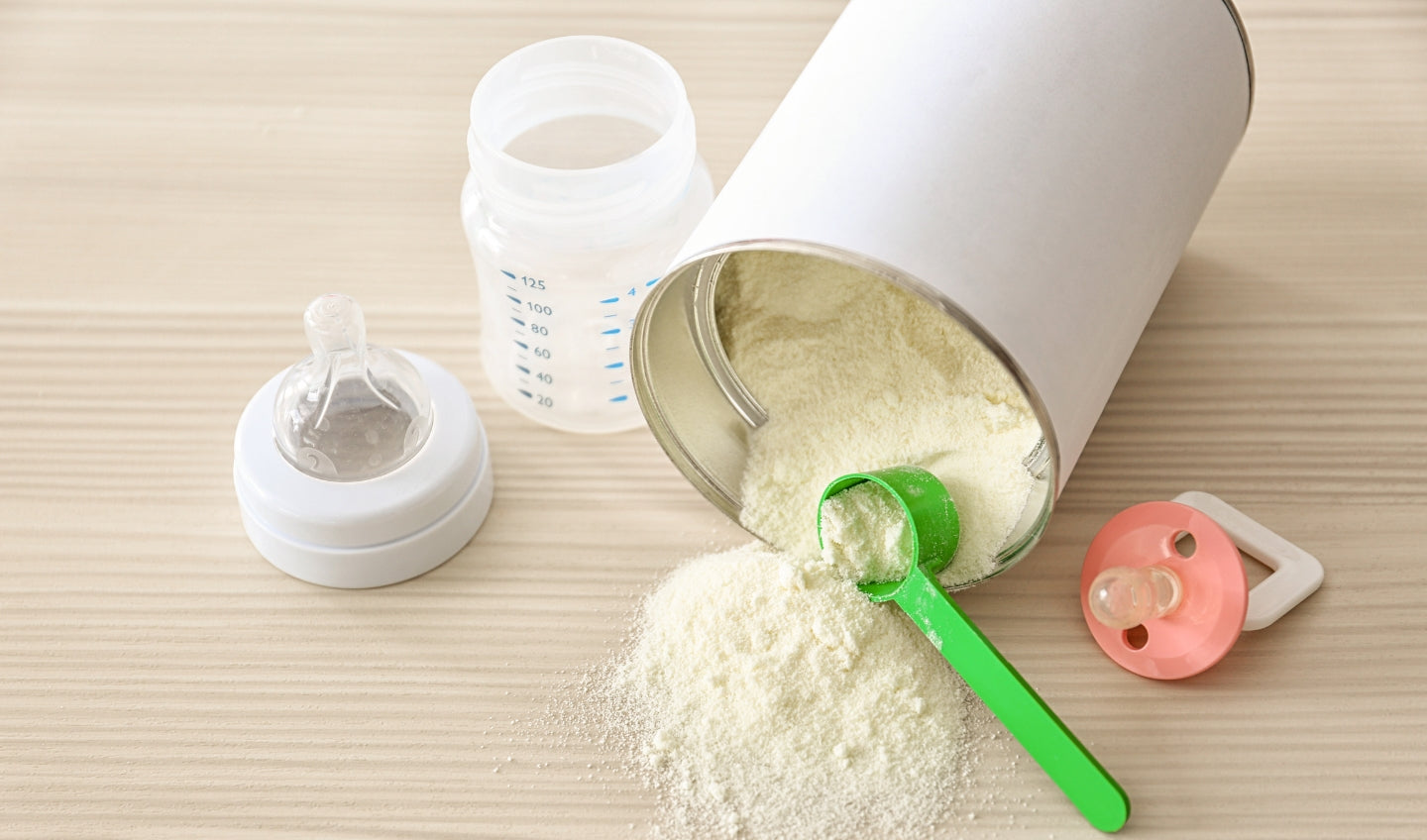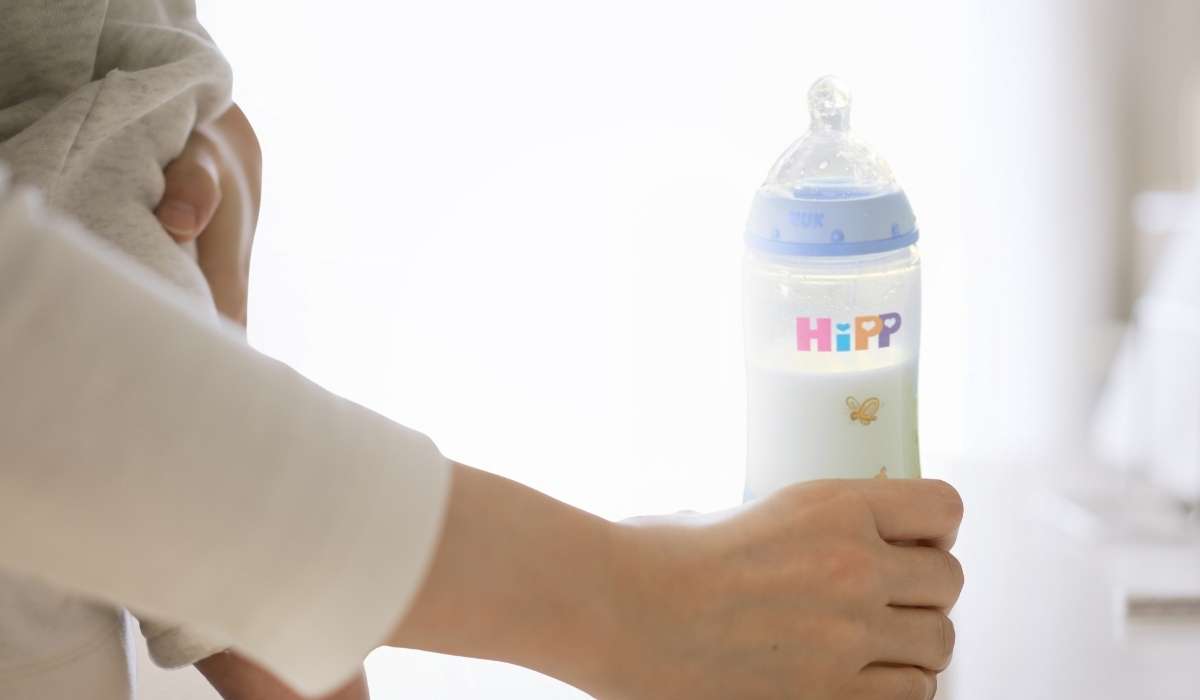Finding the best formula for your little one can be a stressful experience filled with a great deal of trial and error. When you add food allergies or intolerances into the mix of things to accommodate, the search quickly becomes even more complicated.
If you find yourself struggling to find the right hypoallergenic formula for your child, you're absolutely not alone. Countless parents struggle with picking the best option for their babies and can easily become overwhelmed when sifting through the options.
Thankfully, we know your struggle, and today we're here to help make your search simple! We'll guide you through the process of choosing a suitable hypoallergenic baby formula for your little one by explaining the basis of allergies and intolerances in babies, how to manage them, and of course, our top recommendations for hypoallergenic baby formula!
So, buckle up, and let's get started!
Contents
Types and Causes of Allergies and Intolerances
Did you know that approximately 4% of children worldwide suffer from food allergies (1)? At first glance, that percentage may seem like a small number, but it actually encompasses a lot of little ones out there.
If you suspect your baby has allergies, the best thing you can do is educate yourself on the topic and talk to your pediatrician for support and guidance. This will help you understand the idiosyncrasies of your baby's digestive system and make it easier to navigate choosing the best hypoallergenic infant formula.
So, let's hit the books, starting off with an in-depth look at the most common allergies displayed in young babies:
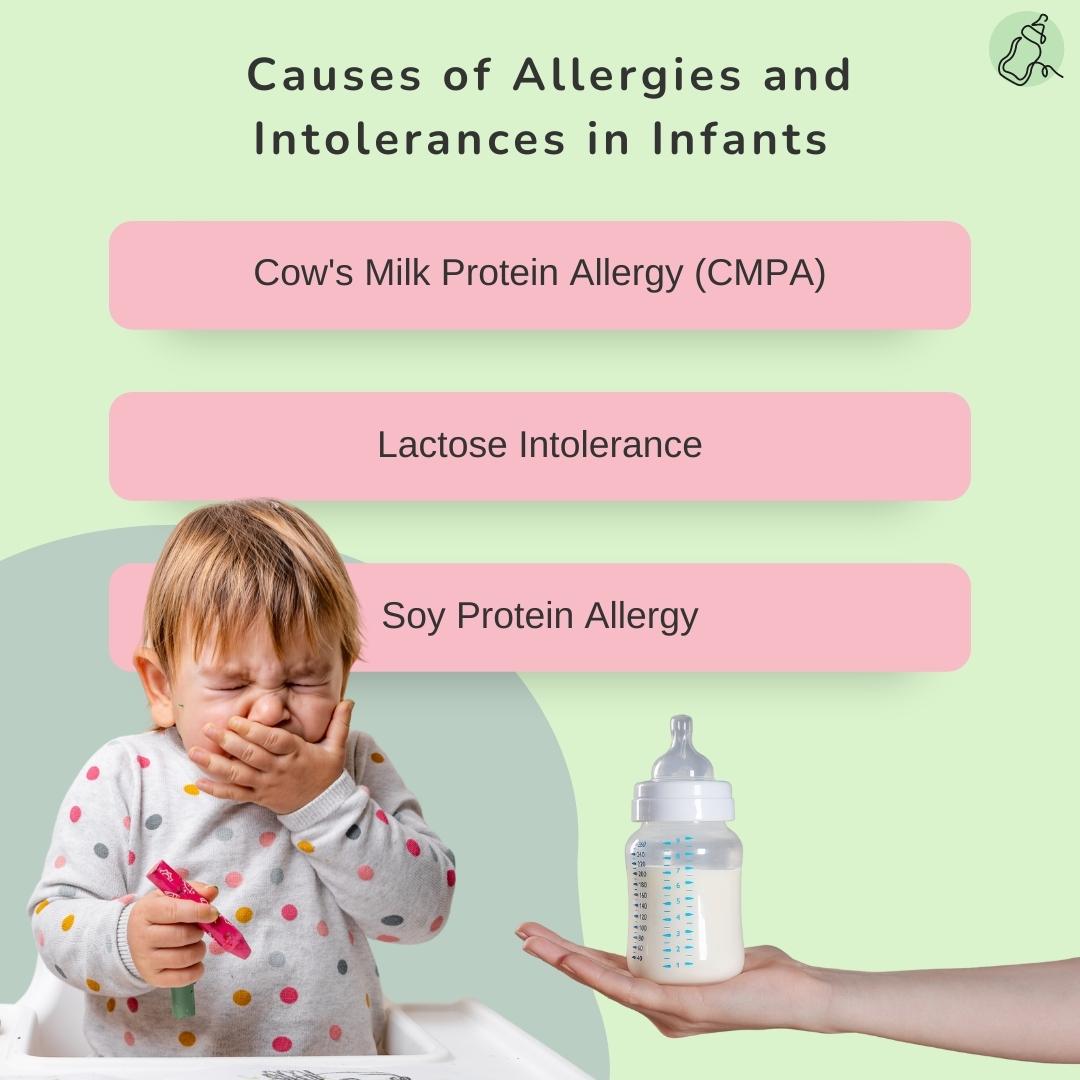
Cow's Milk Protein Allergy (CMPA)
Cow's milk protein allergy, also known as CMPA, is one of the most common allergies in infants. It occurs when your baby's immune system reacts to the proteins found in cow's milk which may include both casein and whey proteins. When babies have CMPA, their immune system perceives those cow's milk proteins as a threat and launches a corresponding allergic reaction.
CMPA Allergic Reactions: Symptoms and Onset
Milk protein allergy typically results in an immediate allergic reaction. Thus, if your baby drinks a cow's milk-based formula and shortly after you notice a rash or hives on their delicate skin, it could be that your child is experiencing a reaction to their milk.
Other common symptoms of cow's milk protein allergies include itching and swelling. In rare cases, babies can also experience wheezing and trouble breathing; this means food allergies can potentially be life-threatening. Thus, you should always contact a doctor if you notice even an innocent rash after giving your baby cow's milk formula.
It's also worth mentioning that cow's milk protein allergies may have a delayed reaction, with symptoms occurring hours to days after you've fed your baby with cow's milk infant formula. These late-onset symptoms may include diarrhea, colic, cramps, vomiting, and even blood in their poop.
Sometimes, symptoms may overlap, which means your little one can have an immediate allergic reaction and develop additional later-onset symptoms afterwards. Thus, it's crucial to discuss any changes in their health with a pediatrician. Additionally, you should mention if you have a family history of allergies to make the diagnostic process easier.
Lactose Intolerance
Lactose intolerance is often confused with cow's milk protein allergy. However, they are two different things. While cow's milk allergy entails an overreaction from the immune system, lactose intolerance is when your baby's digestive system is unable to properly digest lactose, often leading to discomfort, diarrhea, and bloating.
What Causes Lactose Intolerance?
Lactose intolerance occurs when the small intestine doesn't produce enough lactase - an enzyme that works to break down lactose for easy absorption. Interestingly, this condition tends to run in families (2), so if one of the parents is lactose-intolerant, there's a chance the baby will have the same issue.
Moreover, premature babies often don't produce enough lactase to digest lactose. However, this problem is often short-term and may go away once they get older and their digestive system matures.
On rare occasions, the small intestine may stop making lactase due to an injury, infection, or disease. That's why it's always a good idea to talk to a medical professional if you see your baby reacting poorly to lactose-containing infant formula.
Soy Protein Allergy
Similarly to CMPA, soy allergies occur when the immune system treats soy protein as a threat triggering an allergic reaction. It's important to know that both soy and milk allergies can co-occur in babies because the proteins found in soy and milk are quite similar.
This means that if a child's immune system identifies the proteins in cow's milk as harmful and triggers an allergic response, it's possible that the immune system may also mistakenly identify the proteins in soy as harmful, causing a similar allergic reaction. This is known as cross-reactivity.
It's estimated that around 10-14% of infants with a cow's milk allergy will also be allergic to soy. It's important to manage these allergies under the guidance of a healthcare professional!
Soy Allergy Symptoms
In many cases, the symptoms of soy allergy are mild. They may include hives, itching (especially in the mouth), mild swelling, nasal congestion, and teary eyes. More serious (but much less frequent) symptoms include coughing, wheezing, difficulty breathing, throat tightness, repeated vomiting, abdominal pain, and dizziness.
We know that was a lot of information, but once you learn more about food allergy symptoms, it will be easier to spot them. And as soon as you do, be sure to consult your baby's pediatrician. A medical professional will help rule out potentially dangerous underlying issues. Plus, they will instruct you on how to safely handle your baby's allergies.
Kinds of Hypoallergenic Formulas
Hypoallergenic formulas are recommended for babies with food allergies because they contain proteins that are broken down into smaller parts. Although the proteins can be broken down by more or less depending on the kind, the general idea is that the smaller proteins are, the less likely they are to trigger an allergic reaction, making the formula safer and easier for your baby to digest.
Understanding the different types of hypoallergenic formulas can help you select the best hypoallergenic baby formula for your little one, along with the guidance of your baby's doctor.
So, let's get to exploring which hypoallergenic baby formulas there are to choose from now!
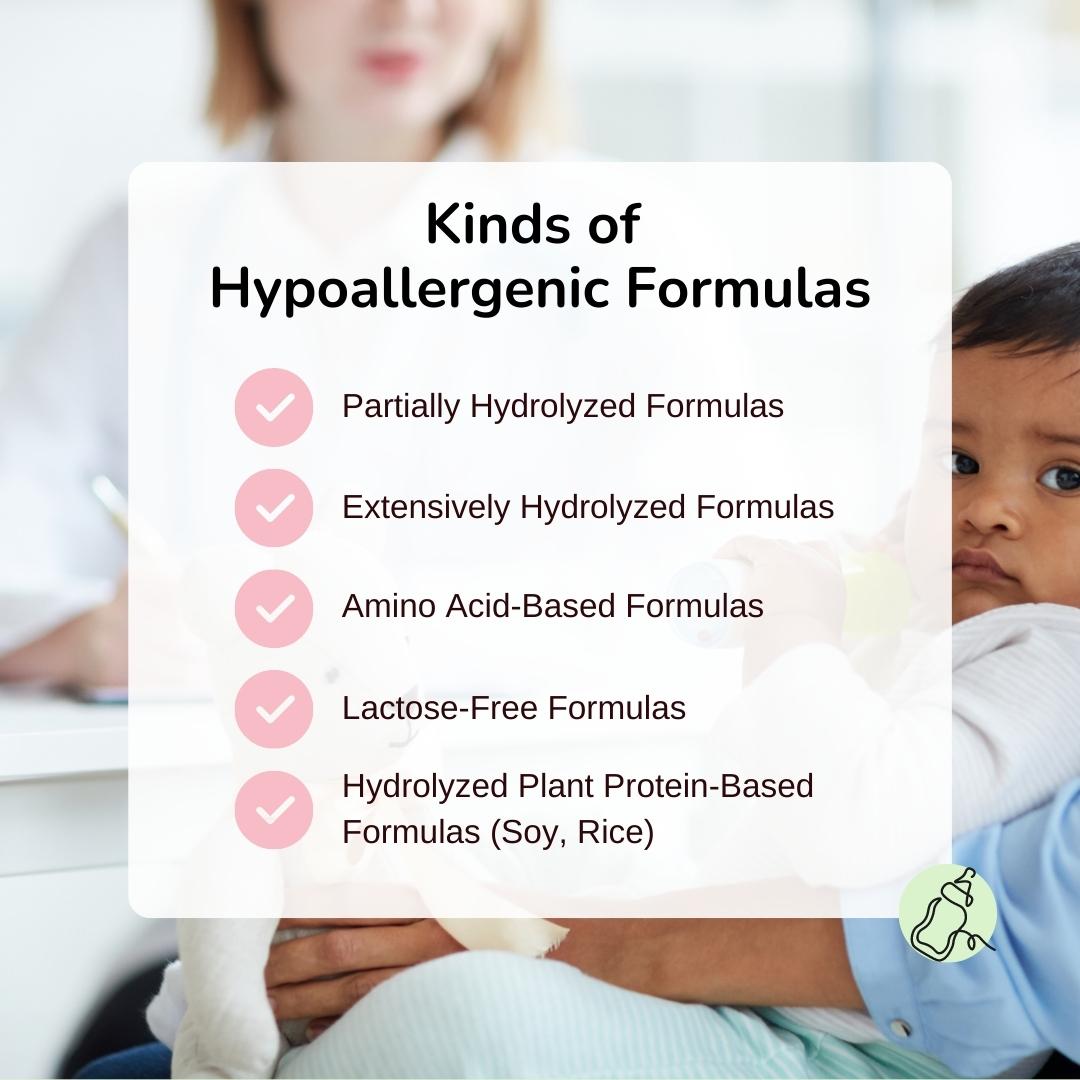
Partially Hydrolyzed Formulas
Partially hydrolyzed formulas contain proteins that are broken down, but not as thoroughly as in extensively hydrolyzed formulas. This means that some proteins are left intact, resulting in a different composition and potential allergenicity.
Hence, a partially hydrolyzed formula may not be the best choice for babies with cow's milk protein allergies but can be suitable for those who are just sensitive to cow's milk.
Extensively Hydrolyzed Formulas
An extensively hydrolyzed formula is considered one of the best hypoallergenic baby formulas. In this type of baby formula, the milk proteins have been thoroughly broken down into small, easier-to-digest components.
This makes it a suitable choice for infants with allergies or sensitivities to cow's milk protein, as the extensive hydrolyzation process reduces the formula's potential to trigger an allergic reaction.
Hydrolyzed Plant Protein-Based Formulas (Soy, Rice)
Hydrolyzation isn't limited to animal proteins; it's also applicable to plant-based proteins, offering an alternative for babies who cannot tolerate cow or goat milk. These plant-based formulas are often based on soy or rice.
While cow or goat milk-based formulas are recommended in most cases of supplemental feeding, in certain situations, your pediatrician may suggest a plant-based formula to cater to specific health needs.
Our Bebe M formula, based on hydrolyzed rice protein, is a top-tier choice for those seeking both a vegan option and an alternative to soy formulas. This organic, hypoallergenic formula is crafted to be gluten, soy, and dairy-free, ensuring wholesome and gentle nourishment for your little one.
Amino Acid-Based Formulas
Amino acid-based baby formula, also known as an elemental formula, is a type of hypoallergenic formula designed for infants who cannot tolerate other types of formula due to severe allergies or intolerances.
As the name suggests, amino acid formulas contain the building blocks of proteins - amino acids. This means the proteins in this baby formula type are broken down into even smaller particles than in hydrolyzed options.
Amino acid formula ensures that proteins can be easily digested and absorbed without triggering an allergic response. This formula is usually recommended by a pediatrician in cases where an infant has severe food allergies, malabsorption, or certain gastrointestinal conditions.
Lactose-Free Formulas
Lactose-free formula is a type of infant formula where the milk sugar, lactose, has been replaced with other types of sugars (for instance, corn syrup solids, glucose, or maltodextrin). This is particularly beneficial for babies who have lactose intolerance, as their body struggles to digest lactose.
However, it's important to note that true lactose intolerance is actually quite rare in babies, and most infants naturally produce enough lactase to digest lactose efficiently.
Lactose-free formula is only necessary in cases where a baby has a confirmed lactose intolerance or specific health issues such as diarrhea.
Gentle Non-Hypoallergenic Alternatives
Many babies, while not necessarily dealing with allergies or intolerances, may still exhibit sensitivity to certain formula ingredients, leading to minor digestive discomfort.
To cater to these tummies, there are a couple of alternatives to traditional cow's milk formula. These alternatives may offer a more comfortable feeding experience for babies dealing with digestive issues.
Lactose-Reduced Formulas
Reduced lactose formula is not a hypoallergenic baby formula, but it can work well for infants who have mild lactose sensitivities rather than intolerance. This formula contains less lactose than standard baby formula and can be gentler on the digestive system.
Goat Milk Formulas
Goat milk, while not hypoallergenic, is often gentler and easier to digest than cow's milk. This makes it a potentially viable option for babies with milk sensitivities or minor digestive concerns.
However, babies allergic to cow's milk may still react to goat's milk formula, so it's not suitable for little one's with true milk protein allergies.
Top European Hypoallergenic Formulas: A Detailed Analysis
Now that we've covered what allergies and intolerances are and how to manage them, it's time to discuss the European hypoallergenic formulas that we offer here at Baby Milk Bar and what makes them so great!
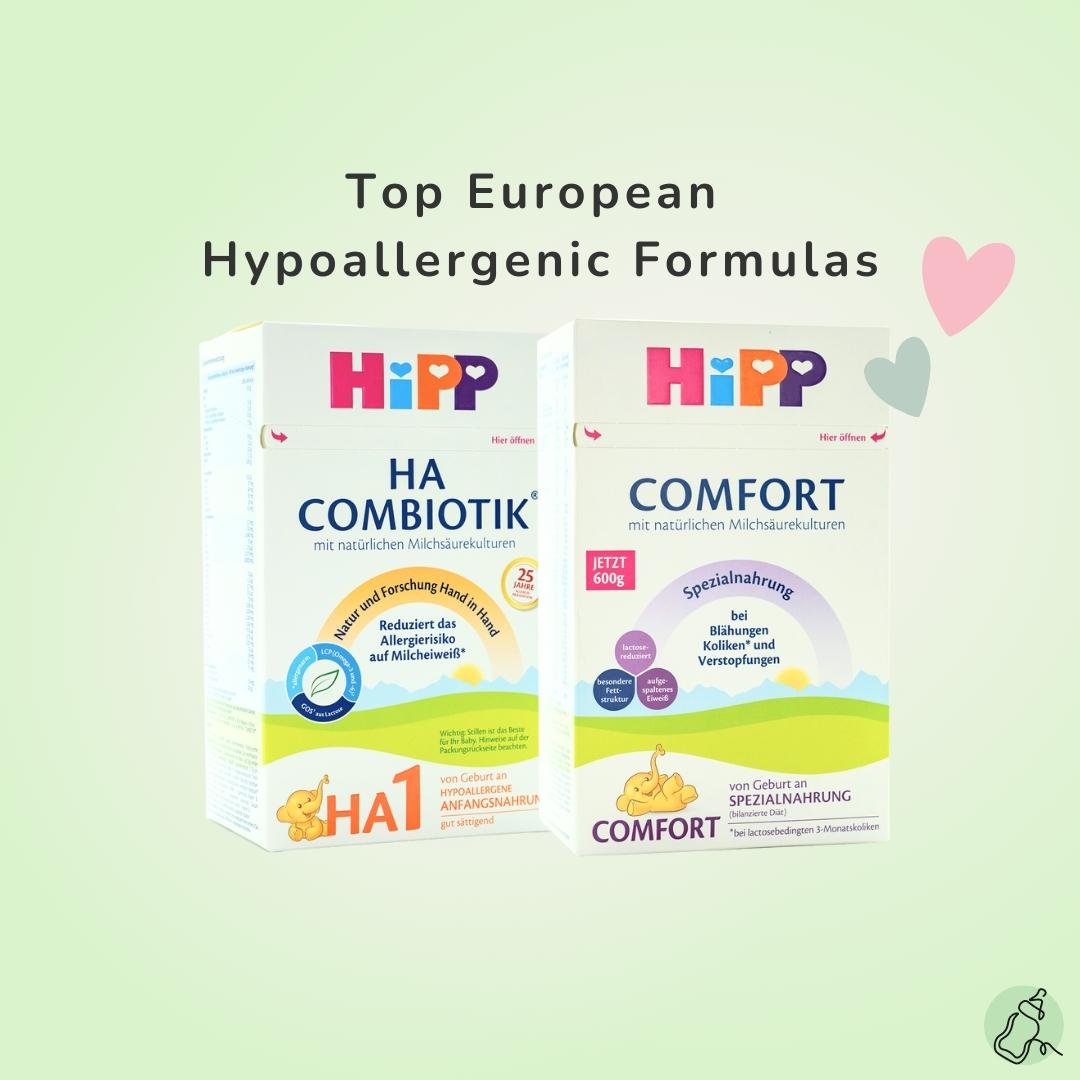
HiPP HA Formula (Extensively Hydrolyzed)
HiPP HA is an extensively hydrolyzed formula redesigned to align with the latest European regulations for hypoallergenic (HA) infant and follow-on formulas. The proteins in the formula undergo extensive hydrolysis, breaking them down into smaller, more digestible components that are less likely to cause allergic reactions.
The revamped formula now includes the mandatory addition of docosahexaenoic acid (DHA), which is crucial for brain and eye development. The protein content is also adjusted to be more compatible with infant nutritional needs.
In addition to hydrolyzed protein and DHA, HiPP HA boasts prebiotic fiber (GOS) from lactose, natural probiotic lactic acid cultures originally extracted from breast milk, and omega-6 fatty acid. HiPP HA also incorporates Metafolin®, a more bioavailable source of folate.
HiPP HA contributes to a balanced gut microbiota, supports the immune system, and reduces the risk of allergies. HiPP HA is available in several stages, from birth to 12+ months. Remember to consult your pediatrician before trying this special HA formula.
HiPP Comfort (Partially Hydrolyzed)
HiPP Comfort is an all-stages formula suitable from birth and specially tailored to address common digestive issues in infants, such as flatulence, lactose-related colic, and constipation. Approximately 40% of babies experience these issues within their first six months of life.
HiPP Comfort is also aimed at regulating and easing stool passage and has a reduced lactose content to alleviate lactose-related issues, along with easily digestible fats and partially hydrolyzed proteins for smoother digestion. Moreover, HiPP Comfort includes beneficial prebiotic fiber (GOS), natural probiotic lactic acid cultures from breast milk, and essential fatty acids (Omega 3 and 6).
In comparison, HiPP HA is an extensively hydrolyzed product designed specifically for babies with a high risk of developing allergies. While HiPP HA reduces the risk of allergic reactions, HiPP Comfort targets common digestive issues of infants, providing gentle relief for a baby's sensitive tummy.
It's important to note that HiPP Comfort is a special formula that should only be used after consulting a pediatrician.
Other European Options for Sensitive Babies
For babies that do not require a hypoallergenic formula but could benefit from a more gentle alternative to traditional cow's milk formula, the following European formulas are particularly soothing for delicate tummies!

Jovie Goat Milk Formula (EU Organic)
Introducing Jovie Goat, a European formula that truly stands out in the market. It's uniquely crafted with organic whole goat's milk and is free of palm oil and GMOs, ensuring a gentle choice for your little one.
Jovie Goat Milk Formula is a favorite choice among parents for a number of reasons. It's made from high-quality organic goat's milk, which is naturally rich in essential nutrients and easier to digest compared to cow's milk. This can be particularly beneficial for babies with sensitive tummies or mild dairy sensitivities.
The formula also includes important fatty acids like DHA and ARA, prebiotic fibers (GOS), and vitamins and minerals. Parents also appreciate Jovie's commitment to sustainability and natural farming practices, providing a product that's not only good for their baby but also good for the environment.
Lastly, with 3 different stages available, Jovie Goat Milk Formula can be used from birth up until toddlerhood, offering continuity and ease of use.
Holle Goat Milk Formula (EU and Demeter Organic)
Another goat's milk option you can try is Holle Goat. This formula is highly valued by parents for its superior quality and strict organic and biodynamic certifications. Sourced from Demeter-quality goat's milk, this formula is an excellent alternative to cow's milk, often being more digestible and suitable for babies with mild dairy sensitivities.
Holle Goat is made without palm oil, utilizing instead organic rapeseed and sunflower oils, which helps ensure a more desirable fat composition. It includes essential nutrients such as Omega-3 and Omega-6 fatty acids, along with all necessary vitamins and minerals to support healthy growth and development.
Parents also favor Holle for its longstanding reputation and unwavering commitment to organic and biodynamic farming practices. This commitment reflects in their products, providing a more natural and sustainable option for infant nutrition.
Holle Goat is available in several stages, from infant formula to toddler formula.
Nannycare Goat Milk Formula (Natural Ingredients)
Nannycare baby formula is a favourite among parents for its unique and natural approach to infant nutrition. The formula is solely derived from pasture-fed New Zealand goats' milk, a wholesome and easily digestible alternative to cow milk formula, ideal for babies with minor dairy sensitivities.
Parents appreciate that Nannycare Goat Milk isn't heavily processed, maintaining the natural whey-to-casein ratio found in goat's milk. This makes the formula closer to breast milk and gentler on your baby's digestion. The formula also includes all essential vitamins, minerals, and Omega-3 and Omega-6 fatty acids for your baby's healthy development.
Another standout feature of Nannycare is their emphasis on simple, quality ingredients, with no added whey proteins, palm oil or soy. The company's commitment to quality and natural simplicity gives parents peace of mind, knowing they're giving their child a nutritious, easy-to-digest formula.
Nannycare offers a range of formulas tailored to different age groups, from birth to 12 months.
Frequently Asked Questions About Hypoallergenic Formulas
Here are some FAQs for everything you need to know about hypoallergenic formula!
How do I know if my baby needs a hypoallergenic formula?
If your baby shows signs of allergenic reactions like excessive fussiness, skin rashes, vomiting, or diarrhea after feeding, they may need a hypoallergenic formula. However, always consult your pediatrician for the diagnosis of allergies and for formula recommendations.
Can I switch back to a regular formula after using a hypoallergenic one?
You should switch only after talking to your baby's doctor. Many babies outgrow their milk allergies, so you may be able to change to a conventional formula, but your baby's pediatrician should evaluate the diagnosed allergy first.
What is the difference between partially and extensively hydrolyzed formulas?
Partially hydrolyzed formula has proteins that are broken down into larger pieces, while extensively hydrolyzed formula's proteins are broken down into much smaller components, making it easier for babies with allergies to digest.
How long does it take for a hypoallergenic formula to help with my baby's allergies?
Typically, parents can notice changes right after introducing the new formula. Slow-onset allergy symptoms, however, may linger for several days even after your baby consumes hypoallergenic formula.
Wrapping Up: Finding the Best Hypoallergenic Formula for Your Baby's Needs
Switching to a hypoallergenic formula can truly make your (and your baby's) life easier. It may improve their digestion and alleviate unpleasant allergy symptoms.
But of course, choosing the best option for your baby will require some thought and research. Just make sure to trust your instincts, make informed decisions, and always consult a medical professional before switching formulas.
And if you're looking for the best one-stop shop to get premium baby formula, check out our site. We carry hypoallergenic European baby formulas and hope you can find the best option for your little angel. We also offer personalized customer support to ensure your baby gets exactly what they need!
Breast milk is the best source of nutrition for babies. Before altering your baby's diet or feeding routine, consult your healthcare provider for personalized recommendations. The information in this article is strictly for informational purposes and is not a substitute for medical advice.


